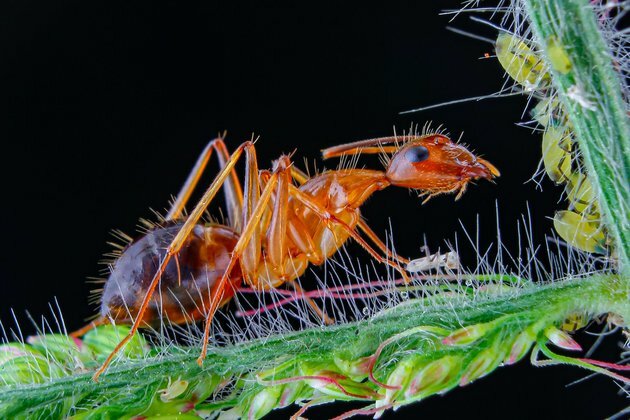Why invasive ants are a silent threat to our ecosystems
The Conversation
20 Sep 2023, 00:09 GMT+10

Invertebrates are often described by experts as the "little things that run the world", and ants are certainly one of the top contenders for this role. Ants help ecosystems to function normally and the total weight of all ants on Earth is roughly equivalent to 1.4 billion people, or 33 Empire State Buildings.
Unfortunately, some ants have become invasive species - organisms transported to a new ecosystem that cause damage. These introductions typically happen accidentally by people but can have dire consequences, as my team's new research shows.
Invasive species are thought to be the second largest threat to biodiversity after habitat destruction. They are a leading cause of animal extinctions, potentially leading to species extinction and ecosystem failure.
The International Union for the Conservation of Nature includes five different ant species on its list of 100 of the world's worst invasive alien species. But while invasive ants have dramatically transformed some of the areas they have been able to invade, other areas appear to be far less affected, or even totally unaffected.
How bad are invasive ants, really?
My team's study draws from research conducted around the world to provide a measure of how bad or good invasive ants are for biodiversity loss. The results show us that invasive ants are every bit as bad as we had assumed.
We extracted data from 46 different research articles that studied how animal communities reacted to invasive ants, and combined the results. We only selected research that was done in relatively "undisturbed" natural environments, free from intensive human activity.
These are areas that invasive ants have dispersed to from more degraded habitats or urban environments. This allows us to more confidently claim that any negative or positive effects on animal communities are because of invasive ants, rather than other invasive species or some form of human disturbance such as agriculture or deforestation.
Our results show that animal communities respond overwhelmingly negatively to invasive ants. We found there were on average 50% fewer individual animals and species in areas invaded by ants, which is a dramatic fall in biodiversity. It is also important to remember these results are averages and, therefore, invasive ants may spell doom for some animal communities above and beyond these numbers.
We also found that certain animal types, such as birds, reptiles and beetles, reacted more strongly than others. Native ants were the most strongly affected group.
This makes sense because many native ants will not only be directly attacked by invasive ants but they will also need to compete with them for food and nest sites. This is also bad news because of the general importance of native ants to the wider ecosystem.
Other groups that were badly affected were birds, beetles, butterflies, moths and reptiles.
We also found that the number of individuals in one insect group - bugs such as scale insects, aphids and mealybugs - increased. This group forms "mutualisms" with ants, which is where each species has a net benefit.
These insects are sap-sucking and exude a sugary liquid called "honeydew", which ants love. Ants will defend these insects from their predators and parasites in return for this sugary secretion, enabling their populations to mutually increase. In some cases, these mutualisms can facilitate invasion - and to disastrous effect.
How can something so small cause such a big problem?
Although ants are small relative to how people perceive the world, they are numerous and tend to interact with a wide range of other organisms. This means they may be able to influence the ecosystem from multiple angles of attack. Invasive ants probably actively hunt down other species but competition for food or space is also important.
Ultimately, we need more research that can tease apart how ants are interacting with other species when they invade a location. What do they eat? Who do they compete with for food? Which habitats do they prefer and why? These questions urgently need answers so we can understand, prioritise and optimise how to minimise the negative effects of invasive ants.
Read more: Why red fire ants and yellow crazy ants have given themselves a green light to invade Australia
Overall, our research is worrying. The reduction in animal diversity may have severe consequences for ecosystem functioning and the long-term future of rare species. Although there are crucial considerations to mitigate or reverse these effects, the conservation implications are not straightforward.
Ant eradication regimes are logistically complex and financially expensive, for example, and more than half fail. Early detection technology, as well as control measures such as toxic baits, can help conservationists prevent or reverse the effects of invasive ants on our ecosystems.
Don't have time to read about climate change as much as you'd like?
Get a weekly roundup in your inbox instead. Every Wednesday, The Conversation's environment editor writes Imagine, a short email that goes a little deeper into just one climate issue. Join the 20,000+ readers who've subscribed so far.
Author: Maximillian Tercel - PhD Candidate in Entomology, Cardiff University 
 Share
Share
 Tweet
Tweet
 Share
Share
 Flip
Flip
 Email
Email
Watch latest videos
Subscribe and Follow
Get a daily dose of Cape Town Express news through our daily email, its complimentary and keeps you fully up to date with world and business news as well.
News RELEASES
Publish news of your business, community or sports group, personnel appointments, major event and more by submitting a news release to Cape Town Express.
More InformationInternational
SectionTragedy in Spain: Diogo Jota and his brother die in car accident
MADRID, Spain: Liverpool footballer Diogo Jota and his younger brother, André Silva, have died in a car accident in Spain. Spanish...
Early heatwave grips Europe, leaving 8 dead and nations on alert
LONDON, U.K.: An unrelenting heatwave sweeping across Europe has pushed early summer temperatures to historic highs, triggering deadly...
U.S. military, China, Russia in Space race
President Donald Trump's plans to build a space-based Golden Dome missile defense shield have drawn immediate criticism from China,...
Trump wins $16 million settlement from Paramount over CBS Harris edit
NEW YORK CITY, New York: Paramount has agreed to pay US$16 million to settle a lawsuit brought by U.S. President Donald Trump over...
British PM faces major party revolt over welfare reforms
LONDON, U.K.: British Prime Minister Keir Starmer won a vote in Parliament this week to move ahead with changes to the country's welfare...
White House meeting between Trump, Netanyahu on July 7
WASHINGTON, D.C.: President Donald Trump will meet Israeli Prime Minister Benjamin Netanyahu at the White House on Monday. President...
South Africa
SectionKL Rahul becomes second Indian after Gavaskar to achieve unique SENA feat
Birmingham [UK], July 5 (ANI): KL Rahul continued his fine overseas run in Test cricket, becoming only the second Indian opener after...
Vaibhav Suryavanshi smashes fastest U19 ODI century, becomes youngest centurion in this age group
Worcester [UK], July 5 (ANI): India's 14-year-old batting sensation Vaibhav Suryavanshi cracked the fastest century in the U19 ODI...
Sanju Samson returns to Kerala Cricket with record-breaking KCL signing
Thiruvananthapuram (Kerala) [India], July 5 (ANI): Indian wicketkeeper-batter Sanju Samson made a record-breaking return to the Kerala...
Xinhua Headlines: BRICS strengthens momentum, stability in Global South cooperation
* In recent years, BRICS has transformed into a major force fostering cooperation among Global South nations. This collaboration not...
West Bengal: Court award life imprisonment to rape accused in post-poll violence rape case
Malda (West Bengal) [India] July 4 (ANI): The Additional District and Sessions Judge of the 2nd POCSO Court in Malda, West Bengal,...
"This is the beginning of him...": Shubman Gill's childhood coach on his heroic 200 against England
Mohali (Punjab) [India], July 4 (ANI): Sukhwinder Tinkku, childhood coach of Indian test skipper Shubman Gill, praised him for his...













